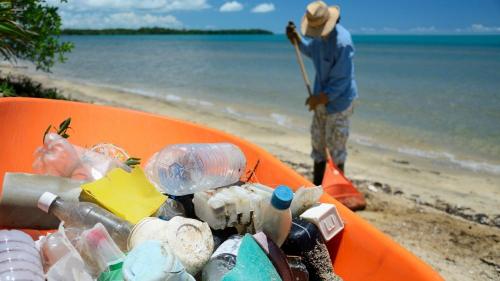https://www.unescap.org/blog/price-plastic-waste-and-solutions-turn-tide
Eight million tonnes of this plastic will end up in the world’s oceans every year, mostly fed from rivers, which serve as direct conduits of trash from some of the world’s fastest-growing cities into the marine environment.
Our relationship with plastic is short term focused. The plastic produced is designed to be single-use. We use it once and then discard it. We like to think this is being recycled but only 9 per cent of all plastic waste ever produced has been recycled. About 12 per cent has been incinerated, while 79 per cent has accumulated in landfills, dumps, or the natural environment as plastic waste, clogging our drains, endangering marine life, and causing health concerns to local people.
There are also massive economic costs associated with marine plastic pollution. According to conservative estimates in March 2020, direct damage to the ASEAN region’s blue economy is placed at USD 2.1 billion per year. Notably, this only covers the direct costs to three industries: shipping, fisheries and aquaculture, and marine tourism. Boats can get tangled up in abandoned or discarded fishing nets, or they might find their engines clogged up with bits of plastic junk. While “Ghost fishing” by derelict fishing gear results in reduced catch sizes. Tourists are also less likely to visit polluted beaches and seas – after all, who wants to dive near damaged coral reefs?
This USD 2.1 billion per year figure is likely to rise significantly under a “business-as-usual” scenario, with plastics production projected to triple between 2020 and 2050. These economic costs also leave tremendous social costs in their wake. In addition to being intimately tied to the fishing and tourism industries for their livelihoods, residents of coastal communities suffer from the damaging health effects of plastic pollution and rubbish brought in by the tides. We must start developing solutions to prevent our oceans from becoming more polluted by plastics and other debris, and beyond that, actually clean up our oceans.
Finding solutions
Solving the marine plastics pollution problem can – and must – be approached from multiple angles.
- Product Design: The first step is identifying plastic products we can substitute with non-plastic, recycled, or biodegradable materials. By engaging with product designers, we can find alternatives to single-use plastics and design re-usable products. Countries need to adopt circular and sustainable economic principles throughout the plastics value chain to achieve this.
- Pricing: Plastics are cheap because they are produced with heavily subsidized oil and can be more affordable, with less economic incentives to use than recycled plastics. Price structures should internalize negative externalities of plastic use and encourage alternative materials or reused and recycled plastics.
- Technology and Innovation: Creating the tools and technology to help governments and organizations measure and monitor plastic waste within their cities. The United Nations Economic and Social Commission for Asia and the Pacific (ESCAP) Closing the Loop project helps cities create smarter policy strategies to combat the problem.
- Creating a Plastic-free Workplace: In 2018, ESCAP banned single-use plastics in all catering operations. All single-use items were replaced with re-usable items or more sustainable single-use options and charged at an extra fee to promote behavioural change among staff and visitors. This initiative could prevent nearly nine tons of waste annually by rethinking our way of working.
- Producer Responsibility: The retail (packaging) sector can apply extended responsibility, where producers are responsible for collecting and recycling products that they release into the market.
- Municipal and Community Actions: Clean-up events on beaches and rivers, and awareness-raising initiatives to inform the public about how their actions contribute to marine plastics pollution (or to its solution), along with bans and levies on disposable plastic bags.
- Multi-Stakeholder Co-operation: Government ministries at the national and local levels, need to work in developing, implementing, and overseeing policies, which also involves industrial manufacturers, NGOs, and volunteer organizations. All these stakeholders need to act coherently and in synergy with one another instead of in silos. Not only do they need the will, but also the resources and funds to do so.
The Organisation for Economic Co-operation and Development (OECD), ESCAP, the Indonesian Coordinating Ministry of Maritime and Investments Affairs, Coordinating Body on the Seas of East Asia (COBSEA), and the ASEAN Secretariat, discussed these issues at the recent OECD Regional Policy Dialogue forum from 15 to 16 December 2020. OECD and ESCAP are working together to provide expertise in policy coherence and sustainable financing to support countries in finding sustainable solutions to these challenges.
Events such as the OECD Regional Policy Dialogue forum allow regional actors to exchange information and develop co-operative efforts to address marine plastic pollution. Together, we can lay the groundwork for solutions that will restore cleaner, plastic-free seas in Southeast Asia.














Add new comment